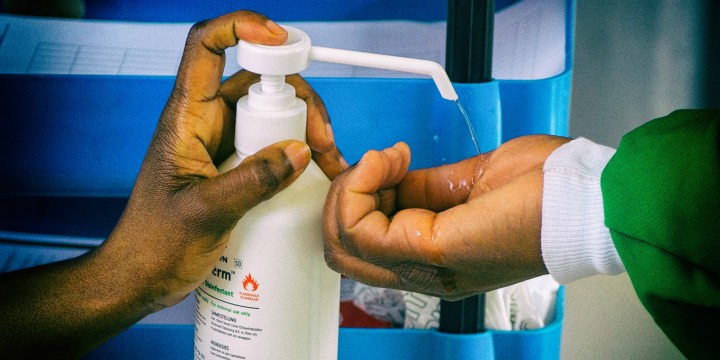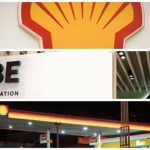BUSINESS MAVERICK
The sanitiser conundrum: It’s complicated, but improving

Consumers may be closer to being able to buy affordable alcohol-based sanitisers on retail shelves since the liquor industry was given a green light to temporarily relax excise duties on alcohol used in sanitisers.
A nationwide shortage of sanitiser ingredients and supplier bidding wars for manufacturers means the average consumer has struggled to purchase alcohol-based sanitiser from supermarkets. Sanitisers in retail situations either sell out instantly or have ridiculous price tags.
But positive change started with gazetted changes being made to the Customs and Excise Act regulations for the liquor industry on 26 March 2020, directly affecting the end price of bottled sanitiser.
The hygiene advice is being drummed in for South Africans trying to avoid Covid-19 infection: Washing your hands is the best defence, but the virus can be deactivated with a minimum 60% alcohol-based sanitiser if soap and water isn’t available. During lockdown, public sanitiser dispensers for communal use appear to be plentiful for queuing grocery customers in many urban shopping malls. But purchasing alcohol-based sanitiser for personal use is a different story.
A process was started just before the lockdown and has been unfolding daily for the liquor industry. Recently, the government has put steps in motion to relax the red tape for sanitiser ingredient manufacturers.
The aim is to reduce the base price for the rollout of sanitiser products and ease production delays for the duration of the National State of Disaster. The key pricing issue is around potable ethyl alcohol availability. In the sanitiser manufacturing industry, ethyl alcohol is referred to as ethanol alcohol and sometimes as “pure 99.9%” alcohol solvent.
Gert Bosman of Distillique, a Gauteng supplier of nationwide stills equipment to distillers certified as essential services providers, told media outlets pre-lockdown that the Covid-19 crisis had brought a “nationwide shortage of not only sanitising agents for surfaces and hands, but on the actual raw materials needed to produce them. The main ingredient in short supply is denatured (non-potable) ethanol.”
If it’s all sounding like a chemistry lesson, try this shorter explanation from KWV’s CEO Boyce Lloyd: “Any potable alcohol usually carries an excise duty in South Africa (usually R215/litre per 100% alcohol cost). So if the alcohol is potable, excise applies. If it is non-potable (also called denatured), then no excise is payable.”
The South African Revenue Service’s (SARS) excise procedures applicable to alcohol production under South African law has been a major sticking point for large or small craft distillers wanting to assist in sanitiser rollout.
“Due to extensive SARS excise procedures and a lack of availability of qualified Excise and Customs inspectors, these producers are not able to denature the ethanol (non-potable). Therefore, they need to sell the product as potable ethanol, with full excise duties paid, making it unaffordable for the general public,” said Bosman.
Higher costs aside, having SARS inspectors visit distillers certified as essential services providers during the lockdown is an impractical logistical hurdle. “Procedures do exist whereby producers of potable ethanol can denature ethanol for other uses, but it involves SARS registrations, applications and the presence of SARS officials during the denaturing process,” said Bosman, pre-lockdown.
Open for trading
“Fortunately, the narrative from last week has had a happy ending,” South African Liquor Brand Owners Association (SALBA) CEO Kurt Moore told Business Maverick on Wednesday 1 April, in response to the 26 March 2020 gazetted “special conditions” for recipients and users of ethyl alcohol for the manufacture of disinfectant. The non-profit organisation represents manufacturers and distributors in the liquor industry.
“SARS acted swiftly and cleared the way for alcohol producers to supply alcohol for manufacturing sanitisers, without paying excise, which would usually be a cost of approximately R215 per litre of absolute alcohol. That additional per litre cost has now been scrapped for producers of alcohol for industrial purposes,” said Moore.
“They implemented new provisions that provide for temporary registrations of manufacturers of non-liquor products; all very helpful.” What has changed temporarily under special lockdown conditions is that sanitiser manufacturers can now register for an excise client code to avoid paying the high excise cost. It’s a victory for various cogs in the supply chain to ensure cheaper, more continuous stock.
Supplier price wars
The liquor industry is not the only source of SA’s ethyl alcohol. A shortage of ingredients from industrial alcohol suppliers such as Ethanol SA, Enterprise Ethanol and Rolfes Chemicals has added to the nationwide problem. Said one Cape Town manufacturer of luxury soap, body wash and sanitisers: “We’ve got substantial orders for the retail sector: the likes of OK, Spar and certain Pick n Pay stores. We’ve got loads of orders we can’t give the green light on.
“We’ve got 100,000 litres of orders just to supply Shoprite Checkers shelves with sanitiser, for the public to buy. I’ve just ordered 60,000 litres from a supplier, but they can’t guarantee they can supply it. They’re advocating hand sanitiser as a frontline defence in the marketplace, but we can’t get the alcohol.”
And prices have climbed as Covid-19 news spread. This manufacturer bottles a 50ml to 1-litre bottle sanitiser format, but cannot fulfil its current retail orders “because we can’t get a constant supply of ethanol at a market-related price”. On 11 February 2020, a supplier quoted them R16.52/litre of alcohol solvent. By 11 March 2020, the price had jumped to R32.80/litre.
“We’ve also had to pay 50% upfront payment deposits,” the anxious manufacturer told Business Maverick. “On 25,000 litres of alcohol solvent, charged at R30.60/litre, we’ve been waiting since the middle of March for the order.”
Liquor industry collaboration
Moore outlined how some bigger-volume SALBA members are producing and supplying alcohol to sanitiser manufacturers, or even using their production facilities to make sanitiser. They include big wine and spirits industry players KWV, Distell and Oude Molen, who collectively donated 200,000 litres of alcohol to assist government and NGOs with sanitiser production or ingredients. “We’re hoping it can be used in hospitals and to support those on the frontline of the fight against the virus,” Moore said.
“Of nearly 200,000 litres of the industry’s donated absolute alcohol at 96%, we then dilute that 96% alcohol to 70% alcohol, so we will get an additional yield of roughly 30% extra. That means we should get just more than 270,000 litres of finished hand sanitiser alcohol,” added Lloyd.
Distell’s Group CEO Richard Rushton said the company has committed 100,000 litres of alcohol to produce sanitisers, and other hygienic and sanitising products to be used “for societal purposes”. The sanitisers will be distributed free to vulnerable communities across South Africa, in collaboration with government and NGOs. “Distell is arguably the largest South African distiller and producer of alcohol, hence we can fulfil an important need at this time,” he said.
The company has ramped up production activities at its Wellington and Goudini distilleries, and received temporary dispensation from SARS for its Monis, Wadeville and Adam Tas activities relating to sanitiser production.
“We are helping wherever we can – it’s for both societal and commercial use,” said Distell’s Frank Ford, group manager of investor relations. “The short version is this: There is no shortage of pure alcohol now. Our Wellington site that produces Bains and Three Ships, and the site in Goudini that produces Amarula and brandy, are all now using 96% proof ethanol alcohol for the production of sanitiser.” Distell bottles a sanitiser and offers sanitiser information on its website.
DGB’s Red Rock Brewery in Lynbro Park, Johannesburg, has also been licenced to operate as an essential services provider, converting to mix bulk alcohol to manufacture 80,000 litres of alcohol a week for the production of hand sanitiser.
Bosman also represents the Southern African Craft Distilling Institute. He said these craft distillers and producers have an additional capacity to produce in excess of 52,800 litres of non-potable ethanol, in turn yielding an additional 66,000 litres of sanitiser per month.
Winemaker Carel Nel of Boplaas in Calitzdorp has a weekly potstilling capacity of 1,000 to 2,000 litres for the production of boutique brandy, gin and whisky. He recommended leaving sanitiser production to the liquor industry’s big players. “If you want to produce alcohol for sanitisers, you need huge fermentation and column-still capacity to produce bigger volumes. You keep on feeding a bigger-volume column still and it runs continuously so it’s far more effective.”
Lloyd confirmed that KWV remains committed to being a significant producer of potable ethanol alcohol at its various facilities, but confirmed that the company’s facilities are not suitable for processing batches into hand sanitisers. KWV doesn’t have capability to bottle, or access to necessary sanitiser ingredients or plastic packaging.
Freeing up additional volumes of liquor industry supplies of alcohol will help, but alleviating the production backlog may not be plain sailing yet. “To make hand sanitiser, you’ve got to add product to the neutral alcohol. You dilute that with ingredients such as lanolin,” said Lloyd. “These are also in short supply. The bottleneck is not only alcohol, but other sanitiser ingredients.”
Lanolin is a key ingredient that is now in short supply. Sourcing plastic bottle packaging is also tricky. “Packaging has been a massive issue,” said the Cape Town soap and sanitiser manufacturer. Its bottles and tube orders have seen delays of nearly six weeks. “You can’t get a bottle pump dispenser for love or money. The price has also quadrupled over time.” BM
Disclaimer: Kim Maxwell was a specialist wine writer for 20 years. She is also a home-based distributor of plant-based cleaning products and a non-alcoholic sanitiser spray, so she has a working knowledge of some of the issues at play.
















